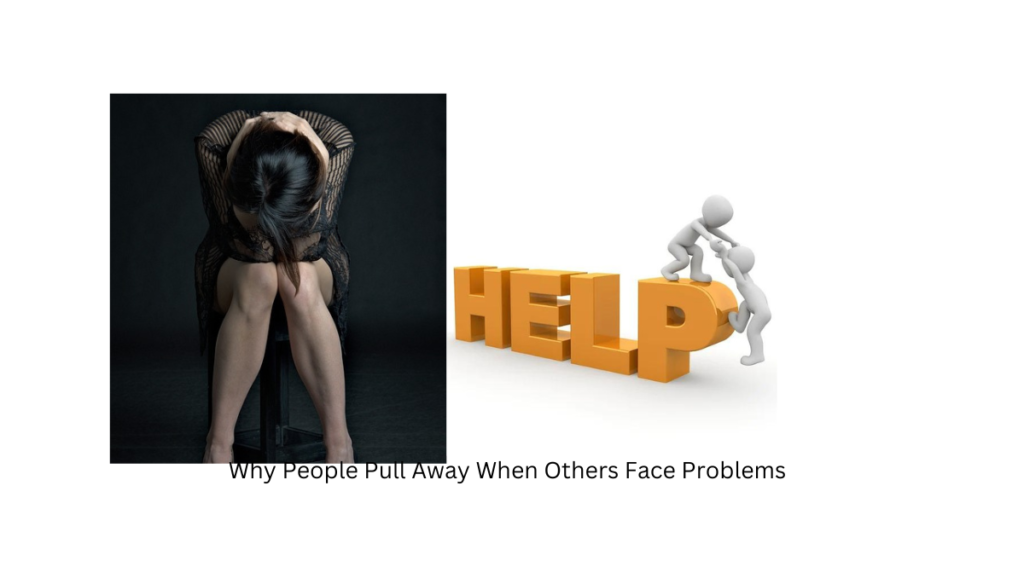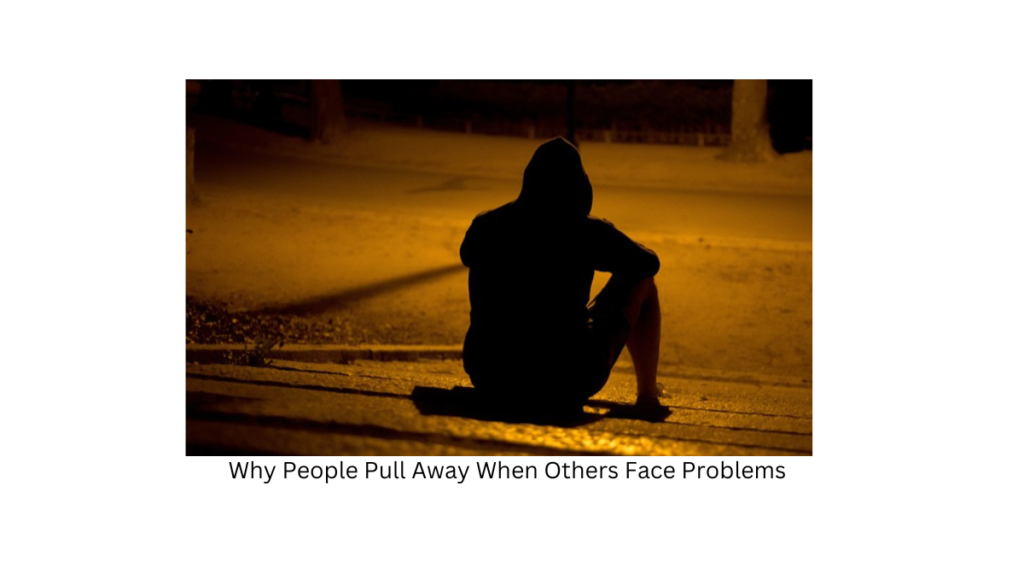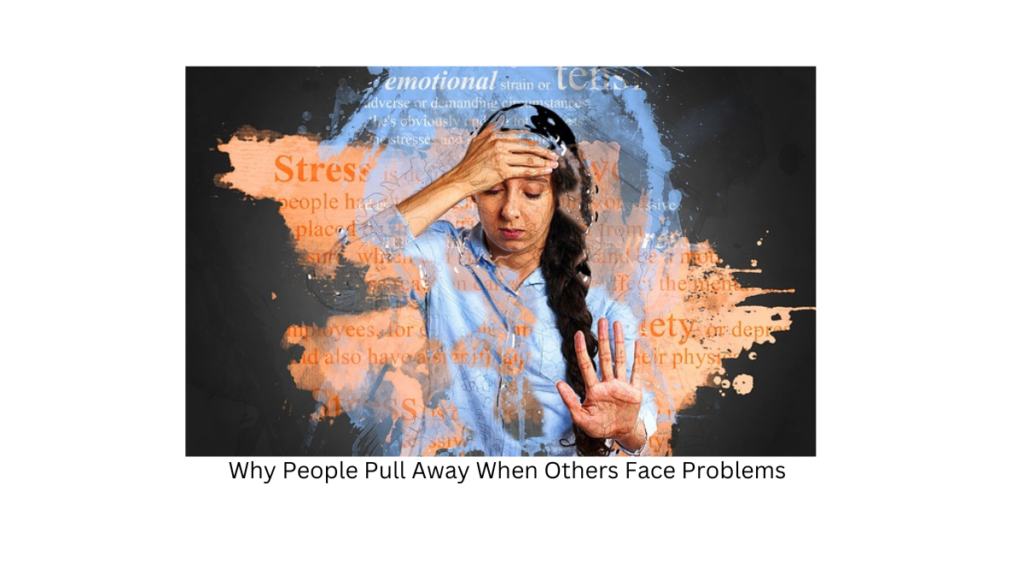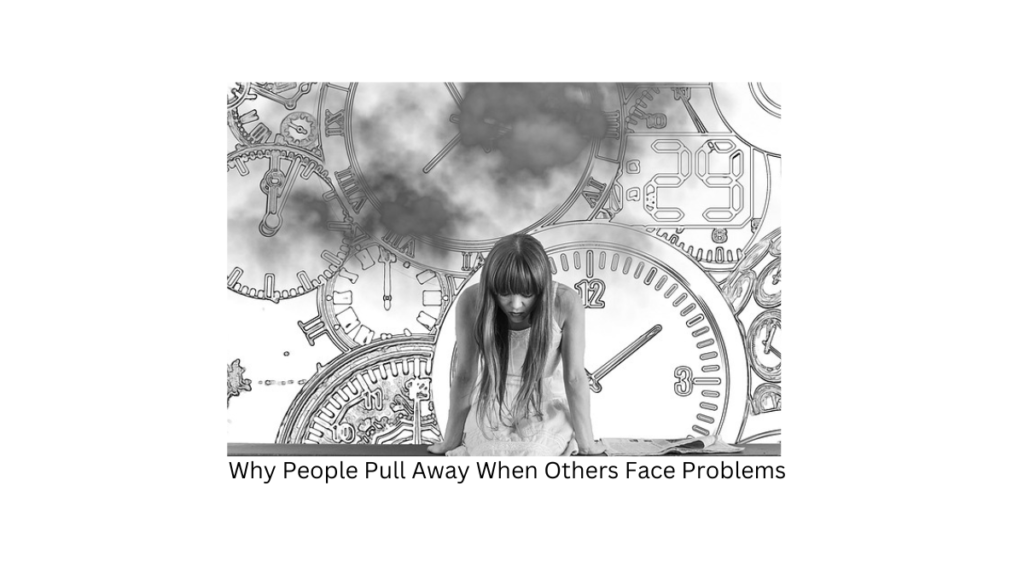Introduction:-
Isolation Instinct: Why People Pull Away When Others Face Problems

In the intricate dance of human relationships, there exists a puzzling and often disheartening phenomenon – the instinctual response for individuals to pull away when others are grappling with problems. This article delves deep into the psychology behind this pattern, seeking to understand why adversity often triggers a retreat response and how we can bridge the gap to foster more compassionate connections.
Why People Pull Away When Others Face Problems?
Picture a scenario: a friend or family member is going through a tough time – perhaps they’ve lost their job, are dealing with a serious illness, or facing a personal crisis. One might naturally expect their loved ones to rally around, offering support, empathy, and assistance. However, reality often tells a different story.

During crises, people frequently exhibit a counterintuitive behavior – they withdraw. They may become less available, less communicative, and sometimes even entirely absent. This paradoxical response has puzzled psychologists and sociologists for generations.
Fear and Self-Preservation
One fundamental reason behind this withdrawal instinct lies in our innate fears and the primal drive for self-preservation. When someone close to us is facing adversity, we are often confronted with their pain and suffering. This can trigger our own fears and anxieties, forcing us to confront the fragility of life and the unpredictability of misfortune.
As a self-preservation mechanism, some individuals instinctively distance themselves emotionally and physically from those in crisis. This distancing can serve as a protective shield against the overwhelming emotions associated with witnessing another’s suffering.
The Fear of Helplessness
Another contributing factor to the isolation instinct is the fear of helplessness. In the face of someone else’s problems, we may experience a deep-seated anxiety about our inability to provide effective assistance or solutions. This fear of not knowing what to say or do can lead to avoidance – people retreat because they don’t want to risk saying or doing the wrong thing.

Ironically, this fear often results in a perceived lack of support for the person in crisis, exacerbating their feelings of abandonment or neglect.
Overcoming the Instinct to Isolate
Understanding the psychological underpinnings of the isolation instinct is crucial, but equally vital is finding ways to transcend it. Building and maintaining strong human connections during difficult times can be a source of immense resilience and healing.
- Awareness: Recognizing that the instinct to isolate is a common human response to crises is the first step. It is not necessarily indicative of a lack of empathy or care. Understanding this can help individuals approach the situation with greater empathy and understanding.
- Communication: Open and honest communication is pivotal. If you find yourself pulling away when someone you care about is facing a crisis, express your feelings and intentions. Let them know that you genuinely care and want to be there for them, even if you are unsure about how best to provide support.
- Offering Concrete Help: Instead of offering vague support like “Let me know if you need anything,” provide specific offers of assistance such as “I can help with groceries” or “I’m here to listen whenever you want to talk.” Concrete offers make it easier for the person in crisis to accept help.
- Respecting Boundaries: Everyone copes differently. Some individuals may need space and solitude, while others may crave company and support. Respect their boundaries and allow them to dictate the level of assistance they desire.
- Educating Yourself: If you feel uncertain about how to offer emotional support during a crisis, educate yourself. Read books, articles, or consult with mental health professionals to learn about effective communication and empathy.
- Seeking Professional Help: In some instances, crises may necessitate professional intervention. If you or someone you care about is struggling with mental health issues, do not hesitate to seek assistance from therapists or counselors.
Why do I push people away when I have problems?
Pushing people away when you have problems is a common emotional response, and it can be attributed to several psychological and emotional factors. Understanding why you might push people away during challenging times can help you address these tendencies and develop healthier coping mechanisms. Here are some reasons behind this behavior:

- Fear of Vulnerability: When you’re facing problems or going through a difficult time, you might feel vulnerable. Sharing your struggles with others can make you feel exposed, as it requires opening up about your emotions and personal challenges. This fear of vulnerability can lead to a desire to withdraw and protect yourself from potential judgment or rejection.
- Avoidance of Burdening Others: You may worry that your problems will burden your friends or loved ones. You might think that they have their own challenges to deal with, and adding your issues to the mix could be overwhelming for them. As a result, you distance yourself to spare them from additional stress.
- Loss of Control: Problems often bring a sense of chaos and unpredictability into your life. In an attempt to regain a sense of control, you may isolate yourself. By withdrawing, you can create a more controlled and solitary environment where you can process your thoughts and emotions without external interference.
- Fear of Rejection: Some people push others away as a defense mechanism against potential rejection. You may believe that if you reveal your problems or vulnerabilities, others might reject you or abandon you. This fear of rejection can lead to preemptive distancing to protect yourself from perceived future hurt.
- Self-Reliance: You might have a strong sense of self-reliance and independence, which leads you to handle your problems on your own. You may view seeking help or support from others as a sign of weakness. While self-reliance is admirable, it’s important to recognize that accepting support from others is not a sign of weakness but a demonstration of trust and vulnerability.
- Lack of Trust: Trust is essential in any relationship. If you have experienced betrayals or breaches of trust in the past, it can make it challenging to confide in others during difficult times. The fear of being let down or hurt again can lead to isolation as a protective measure.
- Emotional Overload: Dealing with your problems can be emotionally draining. You might believe that sharing your struggles with others will only intensify your emotional burden. This can result in withdrawing from social interactions to conserve emotional energy.
- Coping Mechanism: Pushing people away can become a learned coping mechanism. If you’ve used this strategy in the past to deal with challenging situations, it can become a habitual response to stress.
Conclusion
The isolation instinct, triggered by adversity, is a complex interplay of psychology, evolutionary history, and societal dynamics. Although it can be disheartening to witness loved ones pull away during challenging times, understanding the underlying causes and taking proactive steps to foster compassionate connections can help bridge the gap.
In times of crisis, empathy, open communication, and a willingness to adapt to individual needs can make a world of difference. By breaking free from the instinct to isolate, we can ensure that our relationships remain resilient and supportive, even in the face of life’s most daunting challenges.
https://youtu.be/5j3Ky2jI-rc?si=MQepinnSyxwvkP_I





